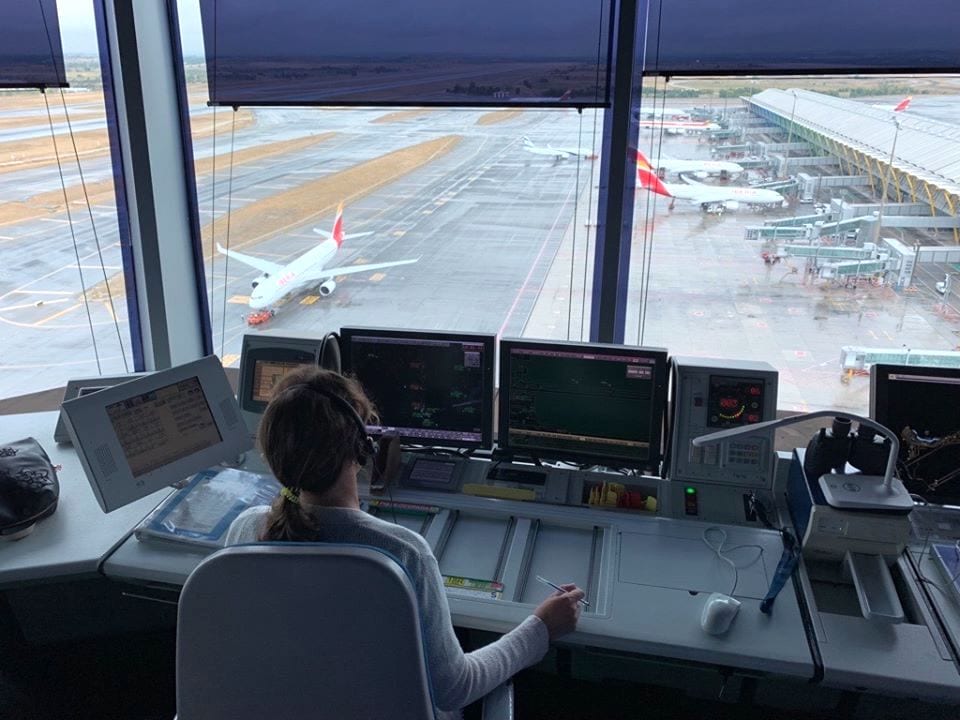
Eurocontrol is extending payments of some air traffic services charges into 2021, as the first week of April saw a number of airlines ground planes and furlough employees amid the outbreak of the COVID-19 coronavirus pandemic. Here, an air traffic controller for ENAIRE, monitors traffic at Adolfo Suarez Madrid-Barajas Airport. Photo: ENAIRE
Eurocontrol is extending the latest deadlines for air traffic services charges incurred by airlines between February and May of 2020 into 2021, as carriers in the region have enacted temporary layoffs and grounded planes due to the impact of COVID-19 coronavirus travel restrictions on revenues.
During their weekly media briefing, the International Air Transportation Association (IATA) estimated that the collective amount of the charges would have totaled 1.1 billion Euros. Under a new agreement, all 41 member states of Eurocontrol voted to delay payment of February’s charges to November 2020, with payments for March, April and May delayed to 2021.
“I am really delighted that our Member States have approved this essential measure. It will provide much needed liquidity support. Many airlines contacted Eurocontrol to confirm that they would not be in a position to facilitate their next payments,” Eamonn Brennan, director general of Eurocontrol said in a statement confirming the payment deferral.
Deferral of the payments come during the first year in which Eurocontrol had introduced a new formula to account for air carriers flying through individual member state airspace. The agency published a statement in January outlining how it now uses the “the actual route flown as recorded by the Eurocontrol Network Manager to establish the distance factor used for the calculation of route charges.” This is in contrast to the previous practice where distance factors were calculated based on the last filed flight plan.
“This change, driven by increasing availability of flight and aircraft data, will ensure that air navigation service providers (ANSPs) receive revenues for those flights that have actually passed through their airspace. It should also increase predictability, and as a result support the most efficient use of airspace in the Network, as it takes away the incentive for airlines to file route charges optimized flight plans that are not always adhered to,” the agency said at the time.
Individual ANSPs have also been adapting to the new flight operational reality. Italian ANSP ENAIRE recently implemented a new airspace policy where its air traffic controllers will give priority to cargo flights carrying healthcare materials. The demand for such materials has kept all-cargo flights at nearly the same level they were in this period last year.
On Apr. 10, Brennan tweeted an infographic of the current level of air cargo flight operations in Europe compared to passenger flights. Eurocontrol also published the latest terminal charges updates published by individual European air navigation service providers, including Croatia and Greece, following updates from their counterparts in Slovenia, Spain and the Netherlands earlier in the week.

All-cargo flights in Europe remain close to 2019 levels, while scheduled and low-cost traffic reduced by 92 and 98 percent respectively during the crisis, according to Eurocontrol. Photo: Eurocontrol
Although organizations representing airlines praised the new plan, some of Europe’s largest operators are grounding airplanes and furloughing employees to account for being unable to earn revenue amid international COVID-19 travel restrictions. The first week of April saw the likes of Lufthansa, SAS and International Airlines Group (IAG) enact new employee and operational policies.
In a statement published April 7, Lufthansa Group confirmed it will permanently decommission six Airbus A380s and seven A340-600s as well as five Boeing 747-400s.
“The six A380s were already scheduled for sale to Airbus in 2022. The decision to phase out seven A340-600s and five Boeing 747-400s was taken based on the environmental as well as economic disadvantages of these aircraft types. With this decision, Lufthansa will be reducing capacity at its hubs in Frankfurt and Munich,” Lufthansa said.
British Airways is using a government-backed job retention scheme to pay more than 30,000 U.K.-based cabin crew and ground-based employees up to 80 percent of their base salary in April and May. The airline also reached an agreement for up to 4,000 pilots to take four weeks of unpaid leave between April and May.
Meanwhile, Scandinavian Airlines (SAS) marked one month since the start of seeing its operations impacted by the COVID-19 pandemic. In a statement published April 7th to its website SAS CEO Rickard Gustafson said the carrier is currently offering no international passenger flights and are only operating a few domestic routes in Norway and Sweden.
“In the light of the sharp decrease in revenue we must continue to adjust our costs to the extent possible. We have been forced to temporarily lay off a majority of our employees. At time of writing, nearly 11 000 employees have been temporarily laid off in Scandinavia. We have also given notice of permanent redundancy for some 120 positions in Sweden,” Gustafson said.